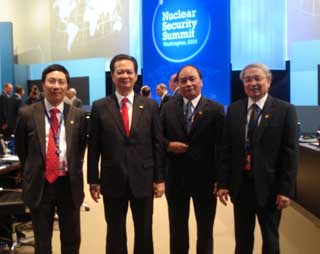 Participating in the Summit Conference were State and government leaders of 37 nations (including the US, Canada, Brazil, Argentina; Russia, France, Germany, Italia; China, South Korea, Japan; Singapore, Malaysia; South Africa, Nigeria), first leaders of 3 international organizations including the United Nations (UN), International Atomic Energy Agency (IAEA) and European Union (EU). In addition, 10 other nations sent representatives who were Vice Presidents, Deputy Prime Ministers or Minister to participate in.
Participating in the Summit Conference were State and government leaders of 37 nations (including the US, Canada, Brazil, Argentina; Russia, France, Germany, Italia; China, South Korea, Japan; Singapore, Malaysia; South Africa, Nigeria), first leaders of 3 international organizations including the United Nations (UN), International Atomic Energy Agency (IAEA) and European Union (EU). In addition, 10 other nations sent representatives who were Vice Presidents, Deputy Prime Ministers or Minister to participate in.
The Conference took place under the circumstance that the issue of ensuring nuclear security has become very urgent in the world. Together with this tendency, more and more nations want to develop nuclear energy applications in economic and social branches, including the development of nuclear electricity, the international communities have been faced with risks of increasing nuclear terrorism. Issues discussed in the Conference were divided into main topics, namely threats of nuclear terrorism, illegal nuclear deals, national actions, international actions and roles of the International Atomic Energy Agency in ensuring nuclear security.
The Vietnamese delegation participating in this Conference was led by Prime Minister Nguyễn Tấn Dũng. Accompanying the Prime Minister were the Minister, Chairman of the Office of the Government Nguyễn Xuân Phúc, Minister of Science and Technology Hoàng Văn Phong, Standing Deputy Minister of Foreign Affairs Phạm Bình Minh and representatives of some relevant ministries and branches.
Participating in the Conference, the Vietnamese delegation has affirmed its consistent policy to consider ensuring nuclear security and safety as the first priority during the process of using nuclear energy and as the responsibility of each nation and of the international communities. Vietnam has also shared common concerns of nations on risks of nuclear terrorism; accused of terrorist actions in every form; strongly supported efforts against terrorism of international communities appropriate with basic principles of international laws and the UN Charter; considered ensuring nuclear security and safety as the first priority during the process of using nuclear energy and as the responsibility of each nation and of the international communities.
Over the past years, Vietnam has actively developed and gradually improved the legal basis for using and ensuring nuclear security and safety; issued the Law on Atomic Energy, Strategy for applying atomic energy for peaceful purposes; established and improved the system of management, research, control agencies for nuclear, nuclear materials and radioactivity sources. On this basis, Vietnam has been widely applying radioactivity and nuclear techniques, and currently started to implement the Nuclear Electricity Program for the country’s economic and social development. Regarding the international aspect, Vietnam has actively entered important international treaties in the field of atomic energy, the latest one is the Nuclear Safety Treaty. We have carried out many cooperation activities within the framework of programs and initiatives originated by international communities, including the IAEA – Russia – US Cooperation program on shifting high enriched urani materials into low enriched urani materials for Da Lat research nuclear pile, Europe – Japan – US Cooperation program on using radio-activity discovering equipment in main seaports of Vietnam. We have signed bilateral Agreements in the field of nuclear energy with Russia, China, France, India, South Korea, Argentina and recently the Memorandum of Understanding with the US.
Domestic achievements together Vietnam’s efforts and active contributions have been recognized and appreciated as one of accountable countries when using atomic energy. In this Summit Conference, Prime Minister Nguyễn Tấn Dũng was one of national leaders who were invited to make the first speech in the first plenary session. In his speech, Prime Minister Nguyễn Tấn Dũng has discussed and proposed issues as providing supports for developing countries in human resource training, technical assistance, sharing of knowledge and management experience to develop nuclear energy applications in a safe, security and efficient way; strengthening roles of International Atomic Energy Agency; improving the national consultation mechanism when developing mechanisms, regulations on ensuring nuclear security so that international cooperation activities would be more effective./.